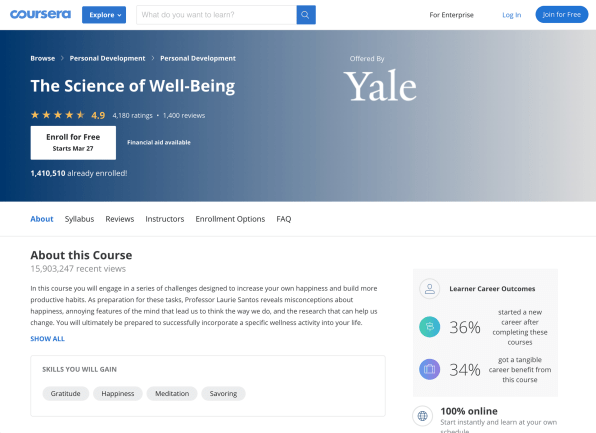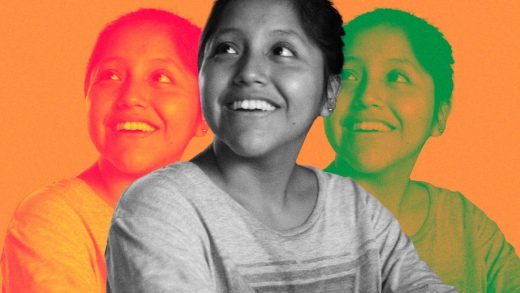Yale’s most popular course ever teaches the science of being happy. Now you can take it for free online
If you haven’t tried out Coursera for yourself yet—or if you hadn’t heard of it before now—it’s the perfect time to get acquainted and get enrolled. Coursera is an online learning platform launched by two former Stanford University computer science professors that offers classes, certificates, and degrees across a broad list of topics, subjects, and skills. They’re offered by high profile companies and instutions including Google, IBM, Stanford and Yale, and taught by some of the most notable academics and professionals in the world.
Right now, Coursera is offering “The Science of Well Being” (Yale University’s most popular course ever) for free. Taken by one in four students at Yale, the class teaches participants to “increase your own happiness and build more productive habits”—a.k.a. skills we could probably all benefit from right now.

The course is taught by Dr. Laurie Santos, professor of psychology and head of Silliman Residential College at Yale University. Dr. Santos also hosts the popular podcast, The Happiness Lab. Over the span of 10 weeks, participants log anywhere between 20 minutes to three hours to complete lessons and assignments—which include videos, quizzes, and readings. The course consists of progressive, research-based lessons that build upon each other, from exposing our misconceptions about happiness and why our expectations are often so wrong, all the way to discovering what truly creates happiness and learning how we can design our personal environments to help ourselves change our behaviors.
The homework in this class all centers around learning more about yourself and being able to switch bad habits with good ones to increase your quality of life. One of the first assignments is to take a character strengths survey developed by happiness psychologists. It measures your individual strengths and helps you to zero in on your best qualities, from self-regulation and humility to appreciation of beauty and gratitude. I found out that my strongest traits are perspective and honesty, and the course focuses the first few assignments on incorporating your biggest strengths more often in your personal life and at work. Very helpful, IMO.
As you work through the other assignments–like learning how to pay attention to small, special moments that happen each day and make note of them to others and to yourself (like telling someone about the especially beautiful flower garden you walked past today)–it’s easy to see how the course uses scientific research and readings to translate into actionable, lasting practices. One section of the course dissects how feeling gratitude activates parts of your brain related to the release of dopamine. Researchers have also found that writing down what you’re thankful for can help with everything from improved sleep to positive behavioral change. So the assignments? To begin writing down five things you are grateful for daily (it only takes about five minutes, too). Others implement random acts of kindness into your day–whether that means leaving a little thank you note for your coworkers or significant other, or buying a coffee for a stranger. Turns out, money can make us happy–if we spend it on the right things.
This course is geared toward anyone with any professional background, although, interestingly, 36% of participants started a new career after completing it. It’s 100% online, and the deadlines are flexible—so you can move them or reset them to match your schedule. The Science of Well Being is a 20-hour course, so it’s recommended to spend about three hours a week on it.
Enroll for The Science of Well Being here.
(24)



